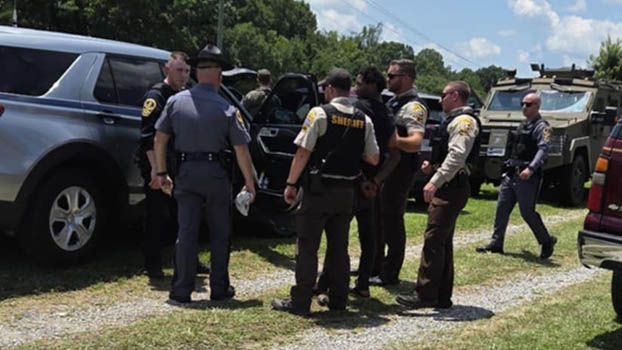A Silent Moment
Published 4:06 pm Thursday, November 15, 2012
BUCKINGHAM – A moment of silence in memory of Taylor Reeves, the daughter of John and Amy Reeves, led off the November meeting of the Buckingham County School Board. Taylor, a 2008 graduate of BCHS, died in an automobile crash.
Before the audience stood in silence, Superintendent Cecil Snead shared that Taylor's mother is a bus driver for the school division; and, her sister, Cristen is a teacher at Buckingham County Elementary School.
Dr. Snead, noting that he was going to offer two presentations, shared that he felt it was time to make a preliminary statement about where his belief structure is with regard to Buckingham County Public Schools.
He began by reminding that the Virginia Department of Education mandates that each division have a comprehensive plan. Offering that Buckingham's current plan runs through 2012, Snead said they, as leaders in Buckingham, have the opportunity to take the school division to new heights, new levels.
Explaining that the comprehensive plan involves a huge process of gathering data and input, Snead advised that they needed to create a mission, a vision, and a slogan that would provide a clear direction.
He offered that they would be able to develop goals in the focus areas of instruction, technology, budget and finance, human resources, community relations, facilities and operations, and health and safety.
Snead explained that he believed they should do a survey of all stakeholders to find out where their interests are and then develop committees to cull through the survey data in conjunction with departmental data to establish goals in the focus areas.
He said the comprehensive plan should be a “breathing document.” A document that evolves each year, a document that can be re-tooled, changed and updated to keep it current.
Snead described the plan as a guide for transparency and direction-a model for continuous improvement. He offered, “It will not be a static document.” He added, “It is not going to be a document that sits on the shelf, which would mean work lost.”
When David Christian asked how long it would take before the document is completed, Snead said he was looking at spring.
From the comprehensive plan, Snead moved to sharing his focus, which he described as his observations since beginning his service as superintendent approximately 75 days ago; and, his thoughts on how to move the division forward.
Offering that he has immersed himself in the school system, Snead said he has talked with kids and teachers, toured classrooms, talked with administrators and parents, and attended extracurricular activities and community functions. By doing so, said Snead, one starts to gain a relevant and accurate picture.
Beginning with instruction, he explained that by utilizing data to inform instruction, they would be able to meet all of the Federal Annual Measureable Objectives. Adding that they needed to focus on the federal graduation indicator, Snead stated, “And we are going to work on that.”
He shared, “We are going to increase the meaningful use of instructional technology.” Snead explained the question is not whether they can use technology but whether they can offer students the opportunity to soar with what they know.
Referencing preschoolers to grade 12, Snead stated, “They are a generation of students born with the technology in their hands and they are able to soar.”
Talking about his focus to introduce opportunities to students through project-based learning, Snead said, “We have to educate ourselves as educators in order to serve our students.”
Another focus, explained Snead, is STEM pathways-science, technology, engineering, and mathematics. Likewise, career pathways need to be implemented in the seventh grade with a portfolio, as mandated by the state, said the superintendent. “If we do that, we are actually going to be increasing industry certifications,” he added.
“We want to look at health pathways. And, again, all of this is encapsulated. We don't have to try to say that we are doing 21st Century learning skills. We don't really have to do that because if we are doing the right things in the classroom, they will come.”
Continuing, Snead said he wants to create transparency in all facets of the organization. He explained that one way to do that is through regular meetings with his staff.
Additionally, he explained that transparency could also be achieved through a dynamic and informative website. Moreover, Snead stressed it is imperative for him to establish regular communications with the board to keep them informed so that they can make the critical decisions confronting them.
Snead said his focus is also on creating a healthy and safe environment, which includes anti-bullying measures, and healthy lunch choices.
In the area of budget and finance, Snead said he wants to create processes and a methodology based on sound practices and in conjunction with the standards, procedures and protocol of the Virginia Association of School Business Officials so that organization will recognize the division.
“We will elevate ourselves with credibility on the financial side. We want to be top tier and over time we will garner that recognition,” stated Snead.
Moving to transportation, he talked about the need to audit the bus fleet and determine the necessity of a purchase schedule.
In the area of human resources, Snead called for a robust applicant pool. “And we want to be able to research methods to compensate our employees in the way they need to be compensated and to look at what type of things we can do to create that,” he shared.
For special education, Snead wants to see the division look at technology that supports and enhances learning for special needs students in an effort to make Buckingham students even more successful than they are.
Concluding, Snead, noting he had other ideas but didn't feel they had maturated enough to share at this time, stated, “Hopefully the committees will agree and infuse these in the comprehensive plan.”
Dr. Snead began his report with the recent weather threat posed by Hurricane Sandy. Because of concern about possible problems, Buckingham schools, along with numerous other school divisions, closed schools on that Monday and Tuesday.
“I would like to thank Mrs. Carter (county administrator) for having a dialogue with me regarding the county's situation and her giving me access to Kevin Flippen (emergency services coordinator),” shared Snead. “I think that was very helpful for us.”
He added, “I would especially like to thank Mr. Ronnie Palmore for being with me on the phone while we talked through this.”
Snead explained that while considering the closing, they reviewed what other counties were doing and reviewed the weather conditions and reports. In turn, they went for safety and caution.
Ragland asked whether make-up days were required when there is a state-of-emergency. The superintendent said he would look into that.
Snead explained that he reviewed the calendar and December 19 and 20, which were proposed as part of the winter holiday, seemed to fit in with ending up the semester, so they were scheduled as make-up days.
During the public comment segment, John Staton, District 4 representative on the board of supervisors, said they were informed of the dialogue between the county administrator and the superintendent in conjunction with the storm.
“It was well received and, speaking for myself and I think one or two other board members, we would like to see as much of it as possible,” said Staton. “The staff was really appreciative that you reached out to them. We thank you.”
Continuing with his report, Snead explained that the change in schedule also resulted in a proposed change in the payroll due dates and distribution dates.
Subsequently, the board approved the new dates as presented with distributions slated for October 31, November 30, December 20, January 31, February 28, March 28, April 30, May 31, and June 28.
Following a presentation by officers from the BCHS Student Council Association, the board approved their request to allow the SCA to use Twitter for communication purposes.
Cam Johnson, SCA president, began by explaining the organization was seeking permission to launch a Twitter page.
He said the page would allow them to post SCA meetings and activities thus informing students so they can be more active and involved in the SCA, which offers students an opportunity for their voices to be heard.
Jennifer Walker, SCA school board representative, shared that unlike Facebook; Twitter does not allow others to post on the page.
SCA vice president Carter Allen explained that only the advisor, president and vice president would have access to the password. “Every incoming set of officers will reset the password,” he added.
He added that the account would be set up to exclude anyone that is not a student at BCHS.
Allen, responding to a question from the board, said they would be open to posting activities and information for other authorized student organizations.
Snead shared that in talking with the students he stressed to them that if their request were approved, the SCA would be the pilot/exemplar for the use of such social media by school organizations.
“We feel like this is a great group to pilot this type of technology,” said Snead. “And once they have shown us what all the potential pitfalls could be and what all the positives are, then we will be ready to spread this out to other organizations.”
Snead offered, “They can get an immediate announcement out there for their constituency so I appreciate their courage to move forward with this.”
Vice Chair Sherry Ragland stressed that anything that is posted should first go through the advisor to make sure it is appropriate.
Carter Allen explained that posts would be made on the school computer in the advisor's classroom.
Johnson added, “So that she would have supervision over everything that is posted.”
David Christian asked how they would know when someone who wanted to be a follower was not a BCHS student.
Allen explained that those who have a Twitter page must include information such as their high school. If that information were unavailable, they would not be allowed to access the page.
SCA Advisor Mary Stearrett shared that plans include getting a master list of students in grades 8 through 12.
At the conclusion of the presentation, Thomas Hutcherson complimented the trio on their presentation and the manner in which they handled answering the questions asked by the board.
Subsequently, Ragland moved to approve the request. With a second by Kathy Midkiff, the board gave its unanimous support.
After the approval, Ragland requested that the students come back at the end of the year to give the board a Twitter report.
The board approved its consent agenda after discussing several items listed on the docket.
A question by Ragland prompted a discussion on the teacher evaluation system and the seven required uniform performance standards.
She asked why, when they approved the teacher evaluation system, they stipulated student academic progress would account for 20 percent of the summative evaluation rather than 40 percent.
Dr. Snead explained that at the time the board approved the evaluation system, which was before his arrival, the state superintendent had not fully determined the percentage. He offered, “Since then…it was changed to a mandated 40 percent.”
Snead assured that they would be looking at all factors. “We are looking at how we can move forward and improve,” he explained. “We are not looking at it as punitive.”
Christian offered that the Virginia School Boards Association had issues with it when he served on that board. He shared that his concern is that a lot of times the best teachers may have the worst performing and most unruly children. In turn, their performance may not show that the teacher is doing such a wonderful job.
He added, “Dr. Snead had mentioned about showing improvement in an area versus just strictly the score.”
Acie Allen stated, “Anytime we evaluate anybody, we've got to use commonsense.”
Responding to a question from Hutcherson about whether the 40 percent would be phased-in, Snead explained that it would be implemented this year with the teachers and administrators; and, in 2014 for superintendents.
From teacher evaluations, the board shifted gears to talk about the increase in bus repairs.
“I'm concerned about how we are continually having to fix the buses that are breaking down,” said Ragland.
“We knew that was coming because we haven't had the money to purchase buses for three years,” stated Christian.
Ragland offered, “The list is growing every month.”
Chairman Ed Wise noted, “Good point.”
Concurring with a recommendation from staff, the board, in a unanimous vote, declared the mobile units at the now closed Gold Hill Elementary and Dillwyn Primary schools as surplus. The board also agreed to sell via sealed bids the three units at Gold Hill this fall and those at Dillwyn Primary in the spring.
The school board unanimously gave its approval for schools and school organizations to participate in the Dillwyn Christmas Parade scheduled for Saturday, December 15, at 10 a.m., in the Town of Dillwyn.
Following a closed session, the board approved its personnel agenda. The appointments included Andrew Johnson, volunteer, assistant coach for JV boys basketball; Micah Haines, JV baseball assistant coach; and Tim Hoag, assistant coach for varsity baseball.





